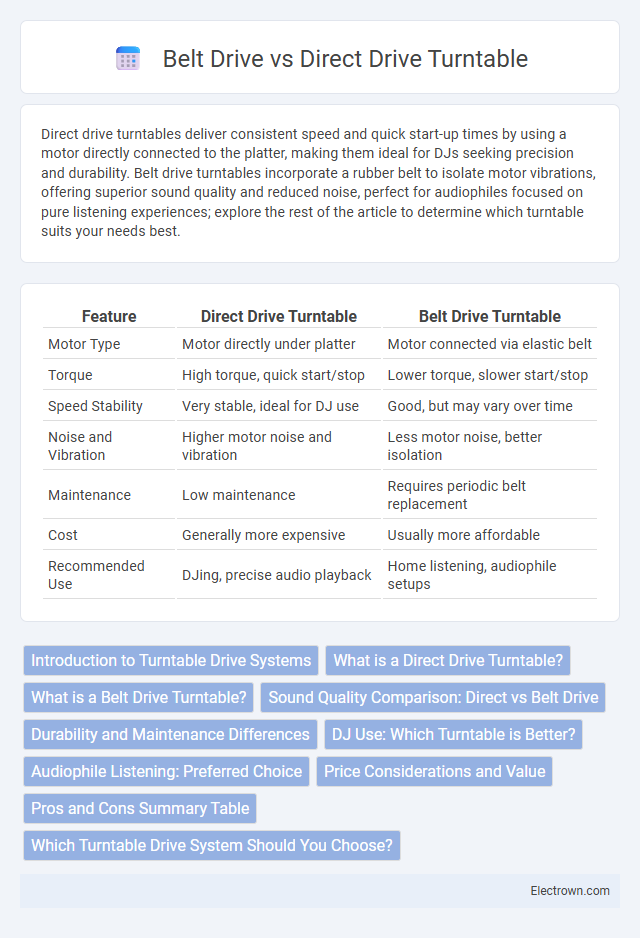Direct drive turntables deliver consistent speed and quick start-up times by using a motor directly connected to the platter, making them ideal for DJs seeking precision and durability. Belt drive turntables incorporate a rubber belt to isolate motor vibrations, offering superior sound quality and reduced noise, perfect for audiophiles focused on pure listening experiences; explore the rest of the article to determine which turntable suits your needs best.
Table of Comparison
| Feature | Direct Drive Turntable | Belt Drive Turntable |
|---|---|---|
| Motor Type | Motor directly under platter | Motor connected via elastic belt |
| Torque | High torque, quick start/stop | Lower torque, slower start/stop |
| Speed Stability | Very stable, ideal for DJ use | Good, but may vary over time |
| Noise and Vibration | Higher motor noise and vibration | Less motor noise, better isolation |
| Maintenance | Low maintenance | Requires periodic belt replacement |
| Cost | Generally more expensive | Usually more affordable |
| Recommended Use | DJing, precise audio playback | Home listening, audiophile setups |
Introduction to Turntable Drive Systems
Direct drive turntables feature a motor directly connected to the platter, providing consistent speed and quick start-up times ideal for DJs and precise audio playback. Belt drive turntables use an elastic belt to connect the motor and platter, minimizing motor noise and vibration for a warmer, more natural sound preferred by audiophiles. Understanding the differences in torque, noise isolation, and maintenance can help you choose the best turntable drive system for your listening experience.
What is a Direct Drive Turntable?
A direct drive turntable features a motor directly connected to the platter, providing faster start-up times and consistent rotational speed, making it ideal for DJing and precise audio playback. This design reduces belt wear and maintenance compared to belt drive models, which use an elastic belt to spin the platter and may introduce slight speed variations. Your choice depends on whether you prioritize durability and torque or subtle vibration isolation for high-fidelity listening.
What is a Belt Drive Turntable?
A belt drive turntable uses an elastic belt to connect the motor to the platter, reducing motor noise and vibrations for improved sound quality. This design isolates the platter from the motor's direct contact, resulting in smoother rotation and higher fidelity audio playback. If you prioritize audio precision, a belt drive turntable offers superior noise isolation compared to direct drive models.
Sound Quality Comparison: Direct vs Belt Drive
Direct drive turntables often deliver more consistent torque and speed stability, resulting in precise sound reproduction with minimal pitch variation, favored by DJs and audiophiles who prioritize accuracy. Belt drive models, by isolating the platter from motor vibrations through a rubber belt, typically produce warmer, less mechanical sound quality with reduced motor noise interference, appealing to listeners valuing a smoother audio experience. The choice between direct drive and belt drive turntables ultimately depends on the listener's preference for either technical precision or tonal warmth in vinyl playback.
Durability and Maintenance Differences
Direct drive turntables feature a motor directly connected to the platter, offering enhanced durability due to fewer moving parts and reduced wear over time. Belt drive turntables rely on a rubber belt to spin the platter, which can degrade and require periodic replacement, increasing maintenance needs. This fundamental design difference means direct drive models typically demand less maintenance and provide more consistent performance in the long term.
DJ Use: Which Turntable is Better?
Direct drive turntables are widely preferred by DJs due to their quick start-up times, consistent torque, and precise speed control, which are essential for scratching and beatmatching. Belt drive models offer smoother sound with less motor noise, but their slower response and potential belt wear make them less reliable for live DJ performances. Your choice should prioritize direct drive turntables if you need durability and performance in demanding DJ environments.
Audiophile Listening: Preferred Choice
Audiophile listeners often prefer direct drive turntables for their precise speed stability and quick start-up times, which ensure accurate sound reproduction and minimal wow and flutter. Belt drive turntables, favored for their natural isolation from motor noise, deliver warmer tones and reduced mechanical interference, appealing to purists seeking a vintage sound profile. Ultimately, the choice between direct drive and belt drive depends on the listener's priority for either precise audio fidelity or a more organic listening experience.
Price Considerations and Value
Direct drive turntables tend to have higher initial prices due to their robust motor design and precision engineering, offering consistent speed stability ideal for DJs and audiophiles. Belt drive models are generally more affordable, providing excellent sound quality with less motor noise, which appeals to casual listeners and vinyl enthusiasts on a budget. Your choice should balance performance needs with budget constraints, ensuring long-term value through durability and sound fidelity.
Pros and Cons Summary Table
Direct drive turntables offer superior torque and quick start-up times, making them ideal for DJs and precise audio playback, but they typically generate more motor noise. Belt drive turntables provide better vibration isolation and a warmer sound quality due to their indirect motor connection, yet they may suffer from belt wear and slower start-up speeds. The pros and cons summary table highlights direct drive models as robust and consistent with potential noise issues, while belt drive units excel in sound purity but require more maintenance.
Which Turntable Drive System Should You Choose?
Direct drive turntables offer superior torque and faster start-up times, making them ideal for DJs and those who require precise speed control. Belt drive turntables provide better vibration isolation and quieter operation, preferred by audiophiles focused on sound quality. Choose direct drive for performance and durability, or belt drive for enhanced audio fidelity and reduced motor noise.
direct drive vs belt drive turntable Infographic

 electrown.com
electrown.com